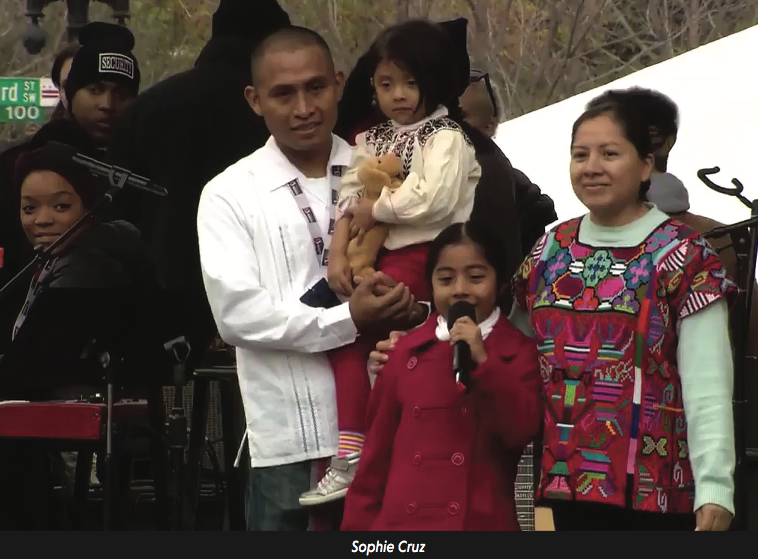[:en]“Kids in the immigrant community have named a bogeyman and that bogeyman is Trump. It is really important to think about that,” says Dr. Joann Dreby, author of Everyday Illegal and Divided by Borders. Dreby, recently gave a lecture titled: Growing Up in the Age of Enforcement: Impacts of “Illegality” on Children, at the University of Nebraska at Omaha. She says that the current social and political climate is scary and depressing for kids.

During her field research she says she came across many immigrant children that were facing major bullying in school, despite the fact that some of them were documented. “A second grader says that they tell him he is stupid because his mom’s from Mexico,” she says, adding “another boy gets jumped because he gets told on the school bus that Mexicans are ignorant. His mom thinks that is why he is always saying that he is not Mexican.”
According to Dreby by the time kids hit middle school these racial and ethnic markers become much more salient and the teasing among peers becomes much more severe and hostile. The immigration expert says that she encountered a young girl that belonged to a family with legal status while she was conducting research in a school. “This girl Fabiola came home from school because she was pushed down the stairs and her arm was broken. When her parents went to complain to the principal, he didn’t really do anything about it,” says Dreby. In fact, Dreby says that Fabiola’s parents ended up moving back to Mexico so their daughter could finish her education there. The author says that the official school statistics don’t list any Latinos on the school roster, despite the fact that there are Hispanics at the school. In essence, to administrators these students are invisible and the bullying incidents are not race-based because “there aren’t any Mexicans in the school.”
When kids are teasing or bullying each other in some communities, they are focusing on legal status, says Dreby. This shows that that illegality is having a huge impact in changing the way we view social distinction in the United States. There is a big misunderstanding of immigration in the United States, even among young children.
“This ten-year old, Andrea, told me that it was hard to be an immigrant because she could get caught by the police,” says Dreby. Not all immigrants are undocumented and the police and ICE are different law enforcement agencies clarifies Dreby, but to this student there is no distinction.
“In this age of enforcement we can see that legal status matters to children’s peer group culture, just like scholars have shown that gender, class and race distinctions are negotiated at very early ages,” says Dreby.
The author points out that a lot of scholars have a singular focus on the adaptation of immigrants to American culture, however, she says that this singular focus disregards the fact that in interaction with peers, children appropriate, reinvent and contest features of adult society.
“From this perspective, we see that children enter into a social nexus and then they interact and negotiate with each other, establishing understanding of social knowledge,” says Dreby. She adds “we should analyze children’s interactions with each other, when kids start employing legal status differences in their peer group interactions, because it is very important.”
“Legal status distinctions are an important part of social differentiation, legal status matters,” says Dreby. She points out that their fears are being personified in people like Trump, however, she points out there is hope. ”There is a lot of opportunity to listen to them,” says Dreby. In fact, she points out that during the Million Woman March earlier this year a little Hispanic girl by the name of Sophie Cruz talked to the huge crowd. According to Dreby the young girl delivered a strong message in both English and Spanish stating “I want all the children not to be afraid!”
“That is what we can hope for, the resistance, even from the youngest voices,” concluded Dreby.[:es]”Los niños de la comunidad de inmigrantes han nombrado a un monstro y ese monstro es Trump. Es realmente importante pensar en eso,” dice la Dra. Joann Dreby, autora de los libros Illegal todos los días y Divididos por fronteras. Dreby, dio recientemente una conferencia titulada: Creciendo en la Edad de Aplicación: Impactos de la “Ilegalidad” en los Niños, en la Universidad de Nebraska en Omaha. Ella dice que el clima social y político actual es aterrador y deprimente para los niños.
Durante su investigación de campo dice que encontró muchos niños inmigrantes que se enfrentan a la intimidación en la escuela, a pesar de que algunos de ellos son documentados. “Un estudiante de segundo grado dice que le dicen que es estúpido porque su mamá es de México,” según Dreby, agregando “los estudiantes asaltan a otro niño y le dicen en el autobús escolar que los mexicanos son ignorantes. Su mamá piensa que por eso siempre está diciendo que no es mexicano.”
Según Dreby, cuando los niños chocan en la escuela secundaria, estos marcadores raciales y étnicos se vuelven mucho más destacados y las bromas entre los compañeros se vuelven mucho más severas y hostiles. La experta en inmigración dice que también encontró a una niña que pertenece a una familia con estatus legal mientras que ella realizaba una investigación en una escuela. “Esta chica, Fabiola, llegó a casa de la escuela porque fue empujada por las escaleras y su brazo se rompió, cuando sus padres fueron a quejarse con el director ellos percibieron que realmente no hizo nada al respecto,” dice Dreby. De hecho, Dreby dice que los padres de Fabiola terminaron regresando a México para que su hija pudiera terminar su educación allí. La autora dice que las estadísticas oficiales de la escuela no mencionan a ningún latino en la escuela, a pesar de que hay hispanos en la escuela. En esencia, para los administradores estos estudiantes son invisibles y los incidentes de intimidación no están basados en la raza porque “no hay mexicanos en la escuela”.
Según Dreby, cuando los niños se burlan o se intimidan mutuamente en algunas comunidades, se están enfocando en el estatus legal, esto demuestra que esa ilegalidad tiene un impacto enorme en forma en que vemos la distinción social en los Estados Unidos. Dreby dice que también hay un gran malentendido de la inmigración en los Estados Unidos, incluso entre los niños pequeños. “Esta niña de diez años, Andrea, me dijo que era difícil ser una inmigrante porque podía ser atrapada por la policía”, dice Dreby.
No todos los inmigrantes son indocumentados y la policía y ICE son diferentes agencias de aplicación de la ley aclara Dreby, pero para esta estudiante no hay distinción. “En esta época de aplicación de la ley podemos ver que el estatus legal importa para la cultura de grupo de niños, así como los estudiosos han demostrado que las distinciones de género, clase y raza se negocian a edades muy tempranas,” dice Dreby.
La autora señala que muchos estudiosos tienen un enfoque singular en la adaptación de los inmigrantes a la cultura estadounidense, sin embargo, ella dice que este enfoque singular ignora el hecho de que en la interacción con los compañeros, los niños apropian, reinventan y cuestionan características de la sociedad adulta. “Desde esta perspectiva, vemos que los niños entran en un nexo social y luego interactúan y negocian unos con otros estableciendo la comprensión del conocimiento social,” dice Dreby. Ella agrega “debemos analizar las interacciones de los niños entre sí, cuando los niños comienzan a emplear las diferencias de estado legal en sus interacciones de grupo de pares porque es muy importante.”
“Las distinciones de status jurídico son una parte importante de la diferenciación social, las cuestiones de estatus legal,” dice Dreby. Ella señala que los temores de los niños están siendo personificados en personas como Trump, sin embargo, señala que hay esperanza. “Hay mucha oportunidad de escucharlos,” dice Dreby. De hecho, señala que durante la Marcha de un Millón de Mujeres a principios de este año una niña hispana por el nombre de Sophie Cruz habló con la audiencia. Según Dreby, la niña entregó un fuerte mensaje tanto en inglés como en español que decía: “¡Quiero que todos los niños no tengan miedo!”[:]




